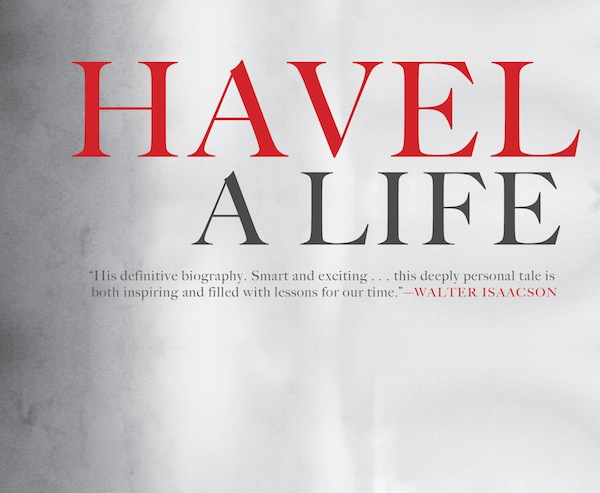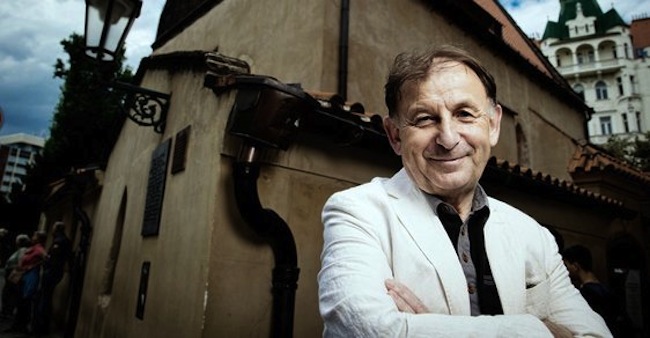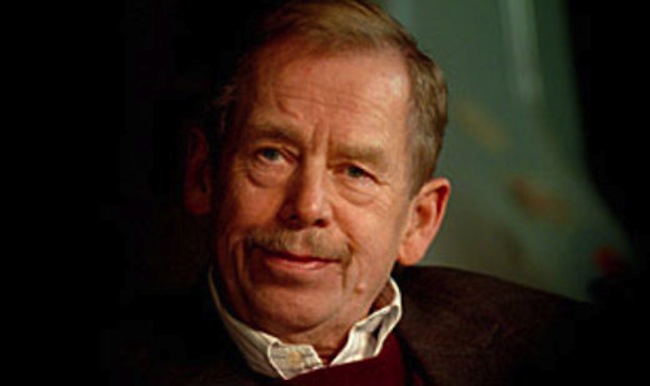Book Review: “Havel: A Life” — A Splendid Biography of a Seminal Artist/Statesman
What this magisterial biography does so well is give us an even-handed portrait of a remarkable, flawed man who is obsessed with a need to help the disenfranchised.
Havel: A Life by Michael Zantovsky, Grove Press, 544 pages, $30.

By Roberta Silman
While I was writing this review I happened to see a old friend who once worked for the National Park Service. When he told me had just been to Prague, I mentioned this biography. “I met Havel,” he said, “when he came to this country he wanted to see James Madison’s house and I was working in that region. He was very interested in the men who wrote The Federalist Papers and worked on the Constitution. The house was virtually a ruin — it has been fixed up since then — but he wasn’t interested in furnishings. He just wanted to walk through it and around it, almost as if the very air and earth would give him the inspiration he needed.”
It is a lovely story and very believable. I could see the thin, smallish Vaclav Havel, who never took on the aura of fame even when he was the most famous man in Europe, thinking as he walked. For what makes Havel such an interesting and important figure was that he was not just a political phenomenon. Harold Pinter called him “a playwright/politician,” and during his highly successful visit to the United States early in 1990, Paul Newman introduced him as an “artist/statesman.” This duality was present until he died in December 2011 at the age of 75. It was what made him unique, why Madeleine Albright said at his death, “He was one of the great figures of the 20th century,” and why his fellow Czech writer Milan Kundera has said, “Vaclav Havel’s most important work is his own life.”
It is what has fascinated his good friend and colleague, Michael Zantovsky, who understands this duality in the most profound ways and has now given us Havel: A Life, a superb biography that will be cherished by both scholars and history buffs. The volume not only brings Havel to life with unparalleled vividness. It also lays out the heart-breaking history of Czechoslovakia: a country that was carved out of the old Austro-Hungarian Empire in 1922, whose people suffered oppression under the Germans and Russians, somehow survived the disastrous Prague Spring of 1968, and finally came into their own with the miracle of the Velvet Revolution. And, as the President of Czechoslovakia from 1989-1993 and the Czech Republic, from 1993-2003, Havel is probably more than the greatest Czech citizen — his dream moved well beyond the borders of his country. He rightfully deserves Zantovsky’s high praise near the end of the book: “If most of Europe today is safer than at any time in its history, it is not least thanks to the vision of statesmen like Bill Clinton, Lech Walesa . . .and Vaclav Havel.”
Zantovsky is thirteen years younger than Havel, a former friend, spokesman, press secretary and advisor while Havel was in office, and also the former Czech ambassador to the US and Israel. Now the Czech ambassador to Britain’s Court of St. James, this Renaissance man has somehow found time to write his first book in English, and has managed to bring Havel alive in language that has the intimacy of a memoir yet is fully grounded in the facts. Not an easy thing to do with a period that was so volatile, nor with a man who was a brilliant intellectual, a world renowned playwright, a musician who loved rock and roll, an inspired leader whose need “to repair the world” had been with him since childhood, yet was also a man who smoked and drank too much, sustained a long marriage but was an incorrigible womanizer, had masses of friends, many of them famous, but could also be distant, petulant, secretive, and withholding.
Many of us first knew Havel as a playwright and an activist whose rebellious nature landed him in jail under the Soviets after the failed Prague Spring in 1968. For twenty years, until the Velvet Revolution in 1989, Havel was the crucial part of a resilient force that finally defeated the Soviets. As Zantovsky illustrates time and again, he had an iron will and ideals that took precedence over everything else, whether he was in jail or at his country house or finally in the Prague castle where he was expected to govern — a role he found onerous because, like many intellectuals, he was most comfortable alone with his books.
The details of Havel’s “riches to rags and back to riches again” life, are fascinating. And although it is tempting to recount the trajectory of that life, any reader can find that on the Internet. What this book does so well is give us an even-handed portrait of a remarkable, flawed man who is obsessed with a need to help the disenfranchised, and who is constantly and consistently going against the grain of society in a part of the world that had become so used to repression and powerlessness that it hardly knew there was an alternative.
Until Havel emerged in 1989 and was declared, to the surprise of the world, the President of Czechoslovakia.

Michael Zantovsky — he has written a superb biography of his friend and colleague that will be cherished by both scholars and history buffs.
How did it happen in a part of the world where politics has almost become a dirty word? This is what interests Zantovsky and in his Prologue he offers an explanation by presenting the three concepts of Havel’s moral philosophy:
The first, the ‘power of the powerless,’ also the title of his best-known essay, is almost slogan-like in its simplicity. It makes for a great rallying cry, but at first sight it appears not to be applicable to most day-to-day situations, where power rests with the powerful, and the powerless are just that. Paradoxically, it is even harder to apply when the powerless suddenly find themselves in positions of power. And yet, this concept found an indelible expression in perhaps the only revolution in history that left no victims. The second, ‘living in truth,’ has an almost messianic tinge, and exposes its author to charges of being starry-eyed, hypocritical, or worse. By most definitions of ‘truth,’ Havel can sometimes be caught in contravention to his own teaching, and yet few can fault his determination to live up to the principle as best he could. The concept of ‘responsibility,’ rooted in the ‘memory of being’ completes the triad.
As Zantovsky gives us the details of Havel’s life, beginning with his fortuitous birth as the oldest child of a prosperous Prague family, he is clearly most interested in Havel’s intellectual growth. We have Havel’s reading lists from when he was twenty-one (Akhmatova, Poe, Baudelaire, Sinclair Lewis, Tolstoy, his compatriot, Milos Forman, who would later produce some of his plays as well as the movie Amadeus, his girlfriend, Olga Splichalova who would become his forbearing, loyal and essential wife, and “someone called Karl Marx”). We learn how he began going to clubs where he came face to face with many of the ironies that would mark his plays and later essays, e.g. all the absurdist ways the young handle repression in order to survive.
Zantovsky also sorts out the various influences of rock music in Czechoslovakia, how it was despised by the Russian authorities and “more revered by young people, because of where it was coming from.” As the Russian authorities bore down harder and harder, it became clear that rock and roll and the hippie lifestyle that accompanied it was in danger. Although the fastidious Havel was not part of this fringe culture, which had been forced underground, he “was quick to understand the far-reaching significance of this latest attack on freedom of expression and thought, and came, at first almost single-handedly, to their rescue.”
The resulting trial of some of these “hooligans” was written up by Havel in a play called The Trial, with its obvious reference to Kafka. In it he says:
It is clear that when an event is out of joint with itself . . . then at the same time something unavoidably goes out of joint within us: a new perspective of the world will open a new perspective of our own human possibilities, of what we are and what we could be, and so — torn out of our ‘routine humanity’ we stand once again face to face with the most important question of all: How to come to terms with ourselves?
Havel’s play is a defining moment in his life. As Zantovsky puts it:
Rarely has a political movement been born neither of an idea of changing the world, nor of the opposition to other ideas of changing the world, but rather of an individual, internal, psychological need to find a balance in one’s life. The ambition was simultaneously modest and staggering. Reaching it required nothing more than staying true to oneself. Its corollary was ignoring or resisting the demands of the outside world to suppress, alter, or mask one’s own identity, demands that are present in any type of world, but which were ominously imperative and persistent in the world of post-totalitarian socialism.
But born it was — leading to “Charter 77, the human rights movement [one of whose leaders was Havel] that all the power, might and force of the regime would be unable to suppress.”
For his activism Havel spent about five years total in prison and from that experience there are many reports, some flattering, some not, about his behavior there. But it is undeniable that some great work came out of the prison experience, his Letters to Olga being the best known and most fascinating. It is also interesting to note how devoted Havel’s younger brother Ivan was to him during his prison time. Along with Olga, Ivan knew best how hard prison would be for Havel, and with the persistence so ingrained in this family, did something about it.
The more than ninety numbered letters to his imprisoned brother between June 1979 and January 1983 . . . were written with the explicit aim, ‘so that you don’t atrophy mentally’. This purpose Ivan accomplished not just through being a diligent correspondent, but also through acting as tutor, mentor, spiritual guide, and a medium for the thoughts of others.
His reading list included: Castaneda’s The Teachings of Don Juan, Wittgenstein’s Philosophical Investigations, Tolkien’s Hobbit and Lord of the Rings, Proust’s In Search of Lost Time, Robert Pirsig’s Zen and the Art of Motorcycle Maintenance, Hofstadter’s Godel,Escher, Bach, and words by Kerouac, Bulgakov, Ken Kesey, Vonnegut, Musil, Conrad and many others. His reading helped him reach the precepts of “love, charity, sympathy, tolerance, understanding, self-control, solidarity, friendship” which are among the foundation of the book that eventually became his letters to his wife. And later Zantovsky reminds us that his intellectual pursuits were not bound by his political ideas. For Havel “Russia” did not only mean Czechoslovakia’s oppressor, but the literature that had helped to form him. Zantovsky reminds us that “Although he based his theatrical work on the absurdity principle and loved The Government Inspector by Gogol, he was even more deeply touched by the human kindness and understanding of Anton Chekhov.”

Vaclav Havel — he had an iron will and ideals that took precedence over everything else.
But perhaps the most remarkable part of this often surprising book is the full report Zantovsky gives of Havel’s speech upon receiving an honorary degree at Hebrew University in which he says, “I want to use this opportunity to confess to my long and intimate affinity with one of the great sons of the Jewish nation, the Prague writer Franz Kafka.” In that revealing speech Havel reveals a vulnerability unique among the famous and powerful. At the end he startles his audience by saying:
I am the kind of person who would not be in the least surprised, if, in the middle of my presidency, I were to be summoned and led off to stand trial before some shadowy tribunal . . .Nor would I be surprised if I were to suddenly hear the reveille and wake up in my prison cell and then, with great bemusement, proceed to tell my fellow prisoners everything that had happened to me in the past six months . . .The lower I am, the more proper my place seems; and the higher I am, the stronger my suspicion that there has been some mistake.”
Equally amazing is Zantovsky’s comment:
The language is remarkable not so much because it describes the experience of a misfit among politicians, but because it reveals what many have always suspected about politicians, namely that their craving for power and honours and recognition reflects their deep-seated inner insecurity. Recognizing this as Havel does is not necessarily an antidote to all the folly political ambition may lead to, but it is the first step to controlling it.
It is an insight like this that makes the reader sit up straighter and gain a different perspective, that makes one realize how good Zantovsky is, how splendid and important his Havel is.
As we get closer to the end, Zantovsky is careful to give all sides of the story with the eloquence and honesty we have come to expect from him. He shows us how Havel would need all his self-awareness and inner resources to cope with events that piled up when it became clear that Czechoslovakia would split in two, and when his loyal Olga died in 1996, and his political enemies grew stronger, and his health grew weaker. There was a second marriage which seemed happy, but things were changing – Havel was no longer the hero who could do no wrong. Yet throughout he stuck to his ideals, and it is moving to see that one of the beautifully chosen chapter epigraphs towards the end of this magisterial biography is a quotation from Havel, himself: “Hope is not a conviction that something will turn out well, but a certainty that something has a meaning regardless of how it turns out.”
Just as I was finishing this review I met another friend — this time a young woman who had gone to Prague to work as an engineer and has settled there. When I told her about Zantovsky’s book, her eyes lit up and she said, simply, “I love Havel.” By the end of this book, so did I. So will you.
Roberta Silman is the author of a story collection, Blood Relations, now available as an ebook, three novels, Boundaries, The Dream Dredger, and Beginning the World Again, and a children’s book, Somebody Else’s Child. A recipient of Guggenheim and National Endowment for the Arts Fellowships, she has published reviews in The New York Times and The Boston Globe, and writes regularly for Arts Fuse. She can be reached at rsilman@verizon.net.
Tagged: Czechoslovakia, Havel A Life, Michael Zantovsky
